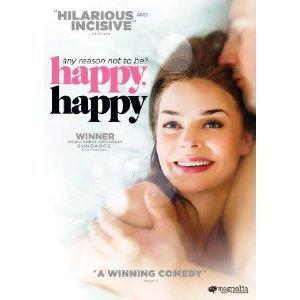Ok, so the Norwegian film Happy Happy (Sykt Lykkelig) from director Anne Sewistsky may not change your world, but it is an entertaining way to spend 85 minutes–especially if you’re interested to see how climate impacts personal lives.
 Happy Happy begins with the arrival of a small family to a freshly rented house–Elisabeth (Maibritt Saerens), her husband Sigve (Henrik Rafaelsen), and their adopted black son, Noa (Ram Shihab Ebedy). They’re new to the remote rural area and are renting the house right next to their landlords, another young family composed of Kaja (Agnes Kittleson), husband Eirik (Joachim Rafaelson) and son Theodor (Oskar Hernaes Brandso). Kaja, a happy go-lucky German teacher at the local junior high, can’t wait for the new family to move in. She’s hoping that they’ll become friends, and after an initial introduction, it’s clear that Kaja’s optimism and desperate need for friendship mask a lifeless marriage fraught with problems. Kaja’s neediness and obvious admiration for the other couple (she sees them as being sophisticated and glamorous) spell trouble, and Elisabeth sniffs that Kaja, although pleasant enough, is a shade too desperate. And when there are no other neighbours for miles around, who wants the woman next door to be so needy for any sign of human companionship?
Happy Happy begins with the arrival of a small family to a freshly rented house–Elisabeth (Maibritt Saerens), her husband Sigve (Henrik Rafaelsen), and their adopted black son, Noa (Ram Shihab Ebedy). They’re new to the remote rural area and are renting the house right next to their landlords, another young family composed of Kaja (Agnes Kittleson), husband Eirik (Joachim Rafaelson) and son Theodor (Oskar Hernaes Brandso). Kaja, a happy go-lucky German teacher at the local junior high, can’t wait for the new family to move in. She’s hoping that they’ll become friends, and after an initial introduction, it’s clear that Kaja’s optimism and desperate need for friendship mask a lifeless marriage fraught with problems. Kaja’s neediness and obvious admiration for the other couple (she sees them as being sophisticated and glamorous) spell trouble, and Elisabeth sniffs that Kaja, although pleasant enough, is a shade too desperate. And when there are no other neighbours for miles around, who wants the woman next door to be so needy for any sign of human companionship?
As it turns out, proximity and social isolation can be a dangerous thing, and since there seems to be little to do on those long, Norwegian winter nights, after a few awkward dinners, the 2 couples get together in the evenings to play games. Kaja and Sigve welcome the social interaction, but Elisabeth finds the evenings tedious, and taciturn Eirik would obviously rather be off on one of his mysterious moose hunting expeditions. After games of Charades falls flat, Sigve, much to Elisabeth’s annoyance, invests in the board game Couples. An evening’s entertainment which includes some pointed personal questions, reveals fractured relationships along with the rather embarrassing information that Eirik claims to no longer has sex with Kaja due to her perennial yeast infection–a condition she adamantly denies.
The film’s subplot concerns the relationship between the children, and while the adults play Charades and board games, Theodur decides to make Noa play ‘slave.’ So we see several games afoot–all of which have serious consequences. Sigve, Elisabeth, Kaja and Eirik all try to play at being happily married, duplicitous facades which slip as the film wears on, but even as the couples try to fool each other, honesty between the respective partners isn’t exactly on the table either, and a crisis must occur before some painful truths finally make it to the surface.
Nothing too earth shattering happens here, and the film takes a light, comedic approach to some serious issues. While I didn’t quite buy the ending, for this viewer, the culture and lifestyle adjustments made for climate made this well-acted film entertaining and worth catching.
Happy Happy is an entry into Caroline and Richard’s foreign film festival.

I might like this one as well, especially since it’s not too long.